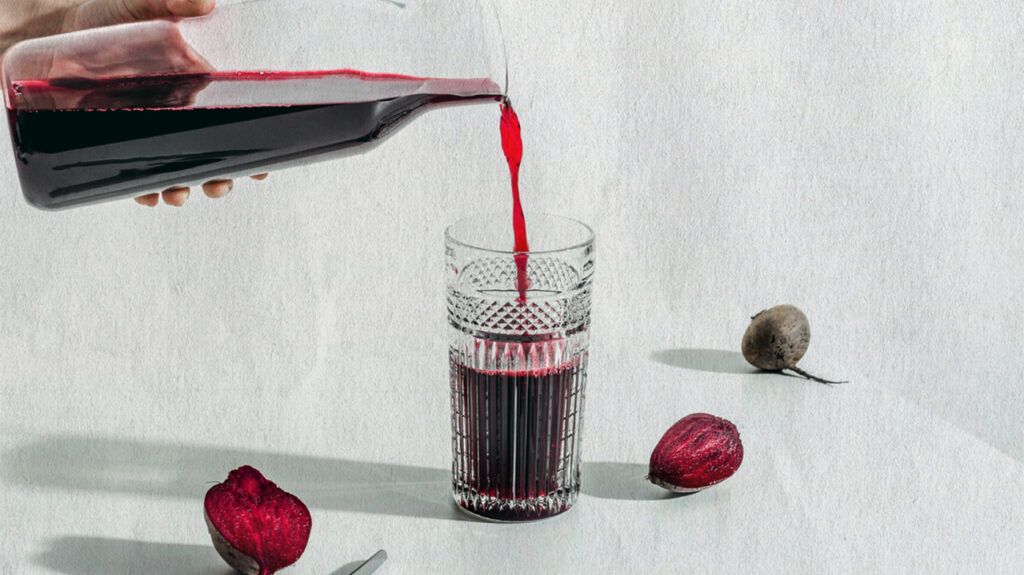Drinks that may help lower blood pressure include certain fruit juices and low sodium vegetable juices. Other beverages, such as caffeinated and sugar-laden soda, can raise blood pressure.
High blood pressure is widespread, affecting
Hypertension treatment involves medication and lifestyle changes. Dietary changes include lowering sodium and alcohol intake, but people may be unsure which drinks to choose.
This article suggests some drinks people can choose or avoid if they wish to manage their blood pressure.

Beetroot juice contains
A
Learn more about the benefits of beetroot.
Unsalted tomato juice may lower blood pressure, according to a
Most study participants consumed about 200 milliliters (ml) of unsalted tomato juice daily for 1 year. At the end of the study period, researchers noted a decrease in systolic blood pressure and diastolic blood pressure in 94 people with untreated high blood pressure or prehypertension.
Learn more about tomatoes and blood pressure.
A 2017 meta-analysis provided evidence that pomegranate juice may lower blood pressure.
The analysis examined eight randomized placebo-controlled trials with a total of 574 participants. Pomegranate juice treatment duration ranged from 2 weeks to 18 months.
The analysis found that pomegranate juice reduced systolic and diastolic blood pressure, and the reduction in systolic pressure occurred regardless of treatment duration.
Learn about the health benefits of pomegranate seeds.
The findings of a 2020 review suggest that cherry and cranberry juice may lower blood pressure.
Two separate cherry juice interventions lowered systolic blood pressure after:
- 30 ml for 20 days
- 330 ml for 6 weeks
Cranberry juice interventions had a mean length of 8 weeks and a dose of 432 ml and reduced both systolic and diastolic blood pressure.
Learn more about the benefits of cherries for heart health.
Black or green tea may lower blood pressure, according to a 2020 review and meta-analysis.
Meta-regression findings suggested that drinking more tea over extended periods of 3 months or more resulted in greater decreases in systolic and diastolic blood pressure.
The review also found that green tea reduced blood pressure more than black tea.
Both black and green tea contain caffeine.
Learn about the caffeine content of tea.
Some beverages may contribute to high blood pressure, and avoiding them may help people manage hypertension.
Alcohol
A
The results suggested a link between alcohol intake and high blood pressure.
Systolic blood pressure had a direct and linear association with alcohol dose. A person’s sex and geographical location influence the effects of alcohol on diastolic blood pressure.
Learn more about alcohol’s effect on health.
Soda
A
The study used data from 2004–2018, involving 1,324 adults, and compared regular soft drinks with their non-caloric counterparts.
The study found that even a single-serving increase in regular soft drink consumption has associations with increases in both systolic and diastolic blood pressure.
There was no association between blood pressure and non-caloric soft drink consumption. However, this may be because not many study participants drank this type of beverage.
Learn more about why Coca-Cola is bad for health.
Caffeine
A 2021 meta-analysis found that caffeinated beverages may raise blood pressure. The analysis found that increased blood pressure was more pronounced in adolescents than adults. Many drinks contain caffeine, including coffee, black tea, soda, and energy drinks.
People can try the following ways to reduce their blood pressure:
- Reduce sodium intake: The
American Heart Association (AHA) recommends a maximum daily sodium intake of 2,300 mg for most adults, with 1,500 mg per day being the ideal daily limit. - Eat a heart-healthy diet: Eating more plant foods and fewer items high in saturated fat are two examples of
heart-healthy dietary practices. - Exercise: Regular exercise, such as
brisk walking , may help improve hypertension. - Stop tobacco use: The American College of Cardiology (ACC) states that smoking is associated with reduced blood pressure control, even for people taking blood pressure medication.
- Manage stress: Psychosocial stress can
cause or worsen high blood pressure. - Reduce excess body weight:
Research has linked excess body weight to increased blood pressure.
Read about 15 ways to lower blood pressure naturally.
High blood pressure is widespread and can lead to adverse health effects. Treatment involves medication and lifestyle interventions.
A person’s beverage choices and diet can contribute to their blood pressure. Some drinks may help reduce hypertension, such as beetroot juice and tea. Other drinks, such as caffeinated beverages and alcohol, can increase it.
Blood pressure resources
Visit our dedicated hub for more research-backed information and in-depth resources on managing high blood pressure.
